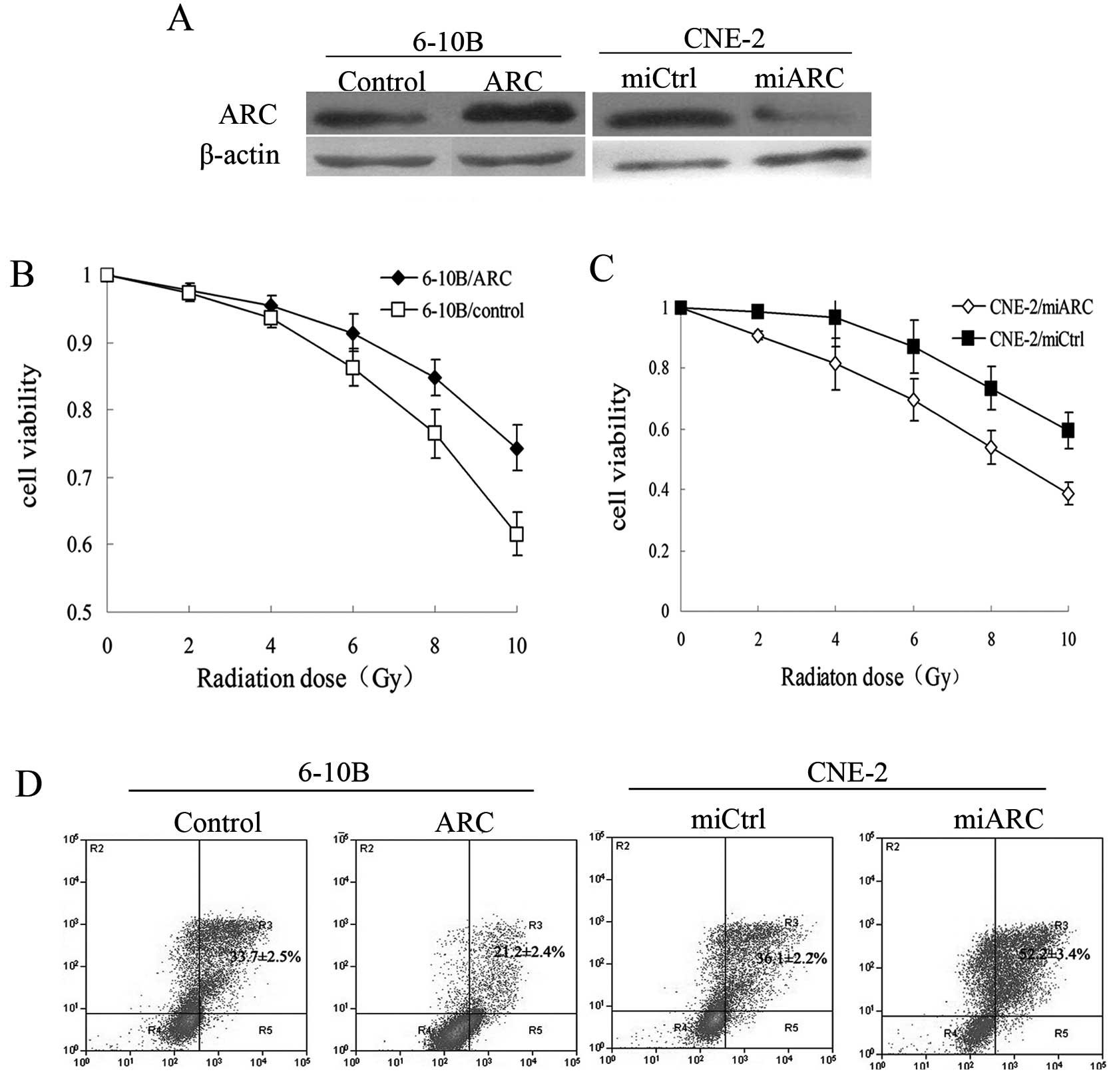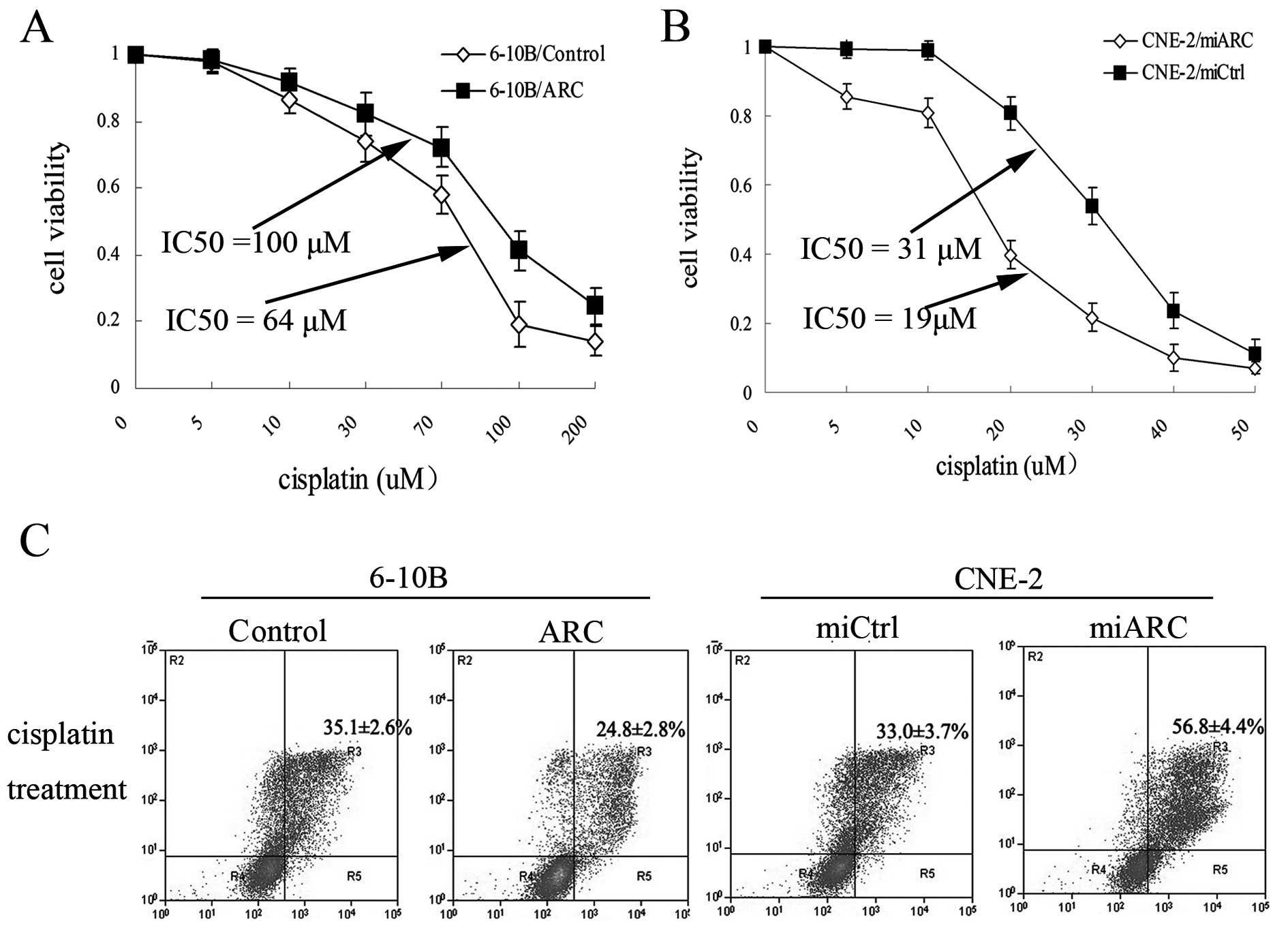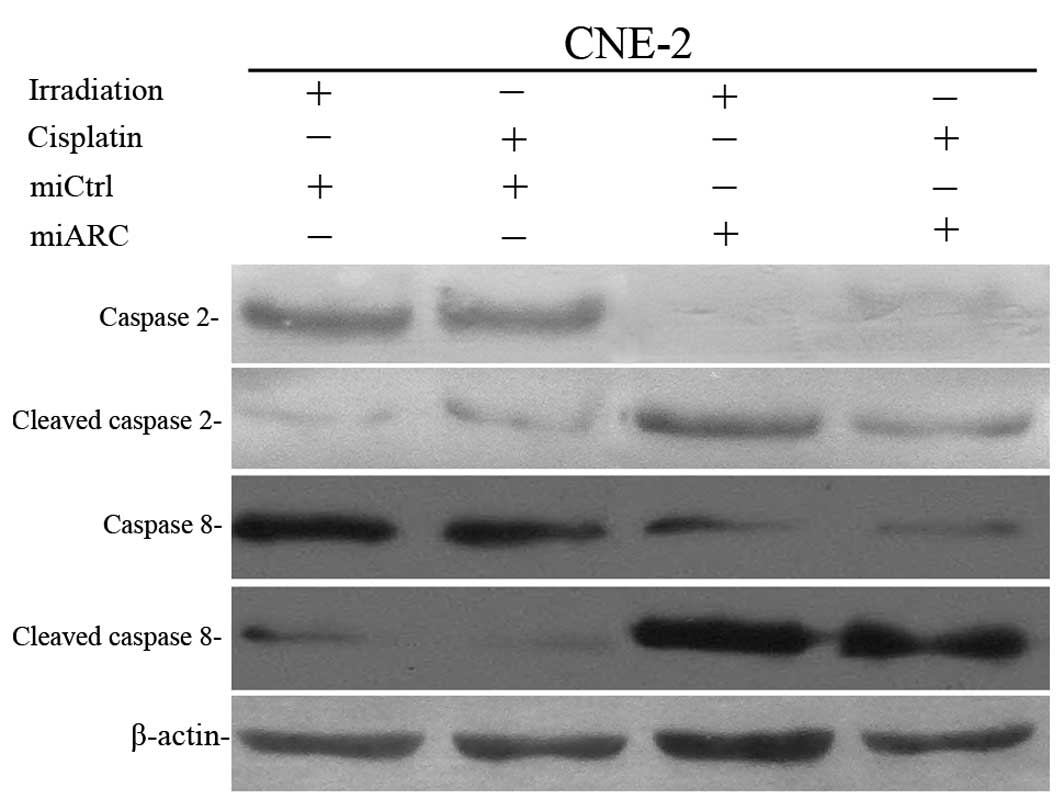|
1
|
Vaux DL and Strasser A: The molecular
biology of apoptosis. Proc Natl Acad Sci USA. 93:2239–2244. 1996.
View Article : Google Scholar
|
|
2
|
Thompson CB: Apoptosis in the pathogenesis
and treatment of disease. Science. 267:1456–1462. 1995. View Article : Google Scholar : PubMed/NCBI
|
|
3
|
Nam YJ, Mani K, Ashton AW, et al:
Inhibition of both the extrinsic and intrinsic death pathways
through nonhomotypic death-fold interactions. Mol Cell. 15:901–912.
2004. View Article : Google Scholar : PubMed/NCBI
|
|
4
|
Koseki T, Inohara N, Chen S, et al: ARC,
an inhibitor of apoptosis expressed in skeletal muscle and heart
that interacts selectively with caspases. Proc Natl Acad Sci USA.
95:5156–5160. 1998. View Article : Google Scholar : PubMed/NCBI
|
|
5
|
Gustafsson AB, Tsai JG, Logue SE, et al:
Apoptosis repressor with caspase recruitment domain protects
against cell death by interfering with Bax activation. J Biol Chem.
279:21233–21238. 2004. View Article : Google Scholar : PubMed/NCBI
|
|
6
|
Foo RS, Nam YJ, Ostreicher MJ, et al:
Regulation of p53 tetramerization and nuclear export by ARC. Proc
Natl Acad Sci USA. 104:20826–20831. 2007. View Article : Google Scholar : PubMed/NCBI
|
|
7
|
Ekhterae D, Lin Z, Lundberg MS, et al: ARC
inhibits cytochrome c release from mitochondria and protects
against hypoxia-induced apoptosis in heart-derived H9c2 cells. Circ
Res. 85:e70–e77. 1999. View Article : Google Scholar : PubMed/NCBI
|
|
8
|
Neuss M, Monticone R, Lundberg MS, et al:
The apoptotic regulatory protein ARC (apoptosis repressor with
caspase recruitment domain) prevents oxidant stress-mediated cell
death by preserving mitochondrial function. J Biol Chem.
276:33915–33922. 2001. View Article : Google Scholar
|
|
9
|
Donath S, Li P, Willenbockel C, et al:
Apoptosis repressor with caspase recruitment domain is required for
cardioprotection in response to biomechanical and ischemic stress.
Circulation. 113:1203–1212. 2006. View Article : Google Scholar : PubMed/NCBI
|
|
10
|
Wu P, Zhang H, Qi L, et al: Identification
of ERp29 as a biomarker for predicting nasopharyngeal carcinoma
response to radiotherapy. Oncol Rep. 27:987–994. 2012.PubMed/NCBI
|
|
11
|
Qi L, Wu P, Zhang X, et al: Inhibiting
ERp29 expression enhances radiosensitivity in human nasopharyngeal
carcinoma cell lines. Med Oncol. 29:721–728. 2012. View Article : Google Scholar : PubMed/NCBI
|
|
12
|
Geertman R, McMahon A and Sabban EL:
Cloning and characterization of cDNAs for novel proteins with
glutamic acid-proline dipeptide tandem repeats. Biochim Biophys
Acta. 1306:147–152. 1996. View Article : Google Scholar : PubMed/NCBI
|
|
13
|
Wang M, Qanungo S, Crow MT, et al:
Apoptosis repressor with caspase recruitment domain (ARC) is
expressed in cancer cells and localizes to nuclei. FEBS Lett.
579:2411–2415. 2005. View Article : Google Scholar : PubMed/NCBI
|
|
14
|
Mercier I, Vuolo M, Madan R, et al: ARC,
an apoptosis suppressor limited to terminally differentiated cells,
is induced in human breast cancer and confers chemo- and
radiation-resistance. Cell Death Differ. 12:682–686. 2005.
View Article : Google Scholar
|
|
15
|
Mercier I, Vuolo M, Jasmin JF, et al: ARC
(apoptosis repressor with caspase recruitment domain) is a novel
marker of human colon cancer. Cell Cycle. 7:1640–1647. 2008.
View Article : Google Scholar : PubMed/NCBI
|
|
16
|
Sarela AI, Macadam RC, Farmery SM, et al:
Expression of the antiapoptosis gene, survivin, predicts death from
recurrent colorectal carcinoma. Gut. 46:645–650. 2000. View Article : Google Scholar : PubMed/NCBI
|
|
17
|
Krajewska M, Krajewski S, Banares S, et
al: Elevated expression of inhibitor of apoptosis proteins in
prostate cancer. Clin Cancer Res. 9:4914–4925. 2003.PubMed/NCBI
|
|
18
|
Tamm I, Kornblau SM, Segall H, et al:
Expression and prognostic significance of IAP-family genes in human
cancers and myeloid leukemias. Clin Cancer Res. 6:1796–1803.
2000.PubMed/NCBI
|
|
19
|
Hanada M, Delia D, Aiello A, et al: bcl-2
gene hypomethylation and high-level expression in B-cell chronic
lymphocytic leukemia. Blood. 82:1820–1828. 1993.PubMed/NCBI
|
|
20
|
Olopade OI, Adeyanju MO, Safa AR, et al:
Overexpression of BCL-x protein in primary breast cancer is
associated with high tumor grade and nodal metastases. Cancer J Sci
Am. 3:230–237. 1997.PubMed/NCBI
|
|
21
|
Friess H, Lu Z, Andren-Sandberg A, et al:
Moderate activation of the apoptosis inhibitor bcl-Xl worsens the
prognosis in pancreatic cancer. Ann Surg. 228:780–787. 1998.
View Article : Google Scholar : PubMed/NCBI
|
|
22
|
Marone M, Scambia G, Mozzetti S, et al:
bcl-2, bax, bcl-XL and bcl-XS expression in normal and neoplastic
ovarian tissues. Clin Cancer Res. 4:517–524. 1998.PubMed/NCBI
|
|
23
|
Biroccio A, Benassi B, D’Agnano I, et al:
c-Myb and Bcl-x overexpression predicts poor prognosis in
colorectal cancer: clinical and experimental findings. Am J Pathol.
158:1289–1299. 2001. View Article : Google Scholar : PubMed/NCBI
|
|
24
|
Takayama T, Nagao M, Sawada H, et al:
Bcl-X expression in esophageal squamous cell carcinoma: association
with tumor progression and prognosis. J Surg Oncol. 78:116–123.
2001. View
Article : Google Scholar : PubMed/NCBI
|
|
25
|
Verma YK, Raghav PK, Raj HG, et al:
Enhanced heterodimerization of Bax by Bcl-2 mutants improves
irradiated cell survival. Apoptosis. 18:212–225. 2013. View Article : Google Scholar : PubMed/NCBI
|
|
26
|
Huang S, Benavente S, Armstrong EA, et al:
p53 modulates acquired resistance to EGFR inhibitors and radiation.
Cancer Res. 71:7071–7079. 2011. View Article : Google Scholar : PubMed/NCBI
|
|
27
|
Gong JG, Costanzo A, Yang HQ, et al: The
tyrosine kinase c-Abl regulates p73 in apoptotic response to
cisplatin-induced DNA damage. Nature. 399:806–809. 1999. View Article : Google Scholar : PubMed/NCBI
|
|
28
|
Carter BZ, Qiu YH, Zhang N, et al:
Expression of ARC (apoptosis repressor with caspase recruitment
domain), an antiapoptotic protein, is strongly prognostic in AML.
Blood. 117:780–787. 2011. View Article : Google Scholar : PubMed/NCBI
|
|
29
|
Chen T, Chen M and Chen J: Ionizing
radiation potentiates dihydroartemisinin-induced apoptosis of A549
cells via a caspase-8-dependent pathway. PLoS One. 8:e598272013.
View Article : Google Scholar : PubMed/NCBI
|
|
30
|
Paul I, Chacko AD, Stasik I, et al:
Acquired differential regulation of caspase-8 in
cisplatin-resistant non-small-cell lung cancer. Cell Death Dis.
e4492012. View Article : Google Scholar : PubMed/NCBI
|
|
31
|
Cao X, Bennett RL and May WS: c-Myc and
caspase-2 are involved in activating Bax during cytotoxic
drug-induced apoptosis. J Biol Chem. 283:14490–14496. 2008.
View Article : Google Scholar : PubMed/NCBI
|
|
32
|
Hanoux V, Pairault C, Bakalska M, et al:
Caspase-2 involvement during ionizing radiation-induced oocyte
death in the mouse ovary. Cell Death Differ. 14:671–681. 2007.
View Article : Google Scholar : PubMed/NCBI
|
|
33
|
Wang S and El-Deiry WS: TRAIL and
apoptosis induction by TNF-family death receptors. Oncogene.
22:8628–8633. 2003. View Article : Google Scholar : PubMed/NCBI
|
|
34
|
Cuenin S, Tinel A, Janssens S, et al:
p53-induced protein with a death domain (PIDD) isoforms
differentially activate nuclear factor-kappaB and caspase-2 in
response to genotoxic stress. Oncogene. 27:387–396. 2008.
View Article : Google Scholar : PubMed/NCBI
|
|
35
|
Lassus P, Opitz-Araya X and Lazebnik Y:
Requirement for caspase-2 in stress-induced apoptosis before
mitochondrial permeabilization. Science. 297:1352–1354. 2002.
View Article : Google Scholar : PubMed/NCBI
|


















